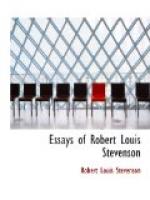[Note 3: The most influential books ... are works of fiction. This statement is undoubtedly true, if we use the word “fiction” in the sense understood here by Stevenson. It is curious, however, to note the rise in dignity of “works of fiction,” and of “novels”; people used to read them with apologies, and did not like to be caught at it. The cheerful audacity of Stevenson’s declaration would have seemed like blasphemy fifty years earlier.]
[Note 4: Mrs. Scott Siddons. Not for a moment to be confounded with the great actress Sarah Siddons, who died in 1831. Mrs. Scott Siddons, in spite of Stevenson’s enthusiasm, was not an actress of remarkable power.]
[Note 5: Kent’s brief speech. Toward the end of King Lear.]
“Vex not his ghost: O, let
him pass! he hates him
That would upon the rack of this tough
world
Stretch him out longer.”]
[Note 6: D’Artagnan ... Vicomte de Bragelonne. See Stevenson’s essay, A Gossip on a Novel of Dumas’s (1887), in Memories and Portraits. See also Note 3 of Chapter II above and Note 43 of Chapter IV above. Vicomte de Bragelonne is the title of the sequel to Twenty Years After, which is the sequel to the Musketeers. Dumas wrote 257 volumes of romance, plays, travels etc.]
[Note 7: Pilgrim’s Progress. See Note 13 of Chapter V above.]
[Note 8: Essais of Montaigne. See Note 6 of Chapter VI above. The best translation in English of the Essais is that by the Elizabethan, John Florio (1550-1625), a contemporary of Montaigne. His translation appeared in 1603, and may now be obtained complete in the handy “Temple” classics. There is a copy of Florio’s Montaigne with Ben Jonson’s autograph, and also one that has what many believe to be a genuine autograph of Shakspere.]
[Note 9: “Linen decencies.” “The ghost of a linen decency yet haunts us.”—Milton, Areopagitica.]
[Note 10: Whitman’s Leaves of Grass. See Stevenson’s admirable essay on Walt Whitman (1878), also Note 12 of Chapter III above.]
[Note 11: Have the gift of reading. “Books are written to be read by those who can understand them. Their possible effect on those who cannot, is a matter of medical rather than of literary interest.” —Prof. W. Raleigh, The English Novel, remarks on Tom Jones, Chap. VI.]
[Note 12: Herbert. See Note 18 of Chapter IV above.]
[Note 13: Caput mortuum. Dry kernel. Literary, “dead head.”]




